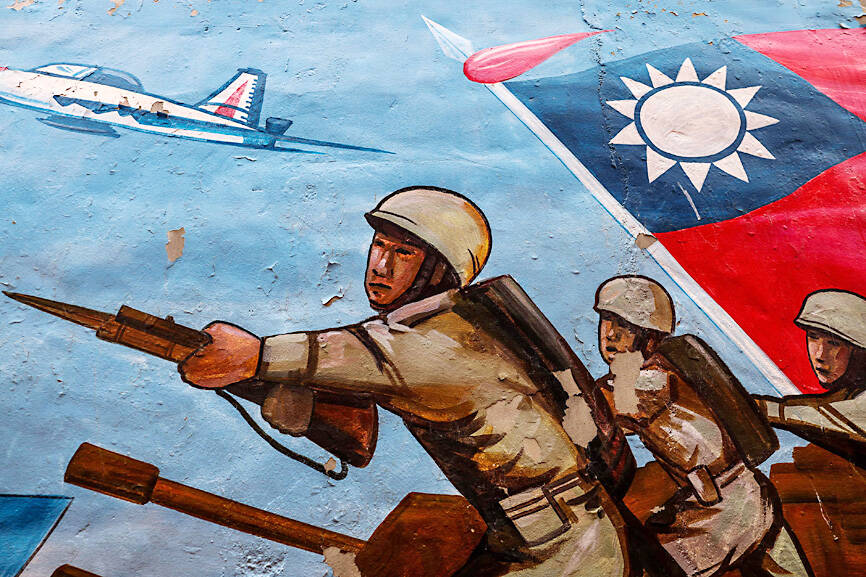A survey by the Chicago Council on Global Affairs and the Ministry of National Defense-run Institute of National Defense showed overwhelming support among Taiwanese and Americans for maintaining the “status quo” across the Taiwan Strait.
However, the poll also showed that Taiwanese and Americans differ in their stances on US military intervention in case of a Chinese attack on Taiwan, with support for such an action relatively lower among the latter.
The survey showed that 62 percent of Taiwanese and US nationals believe bilateral relations enhance national security. Additionally, a majority of Taiwanese expect the US to supply Taiwan with food, medical aid and military aid, should China attempt an armed takeover of Taiwan.

Photo: I-Hwa Cheng, AFP
A majority of US citizens also support sending aid to Taiwan in case of a Chinese attack, the survey showed.
Sixty percent of Taiwanese support maintaining the “status quo,” with 34 backing it “indefinitely,” and 26 percent favoring either declaring independence or unifying with China at a later date, depending on the conditions.
The poll showed that 51 percent of Americans support maintaining the “status quo” across the Taiwan Strait and do not favor Taiwanese independence or unification with China.
Only 27 percent of Taiwanese support declaring independence and 7 percent back unification with China, it said.
In addition, 51 percent of Americans believe the US should encourage Taiwan to maintain the “status quo” instead of promoting independence or unification, while 36 percent support promoting Taiwanese independence even if it increases the risks of conflict with China.
The joint report showed that while Taiwanese and Americans recognize that cross-strait relations affect national security, they differ on potential US response in case of a Taiwan Strait crisis.
The majority of Taiwanese respondents, or 53 percent, believe that the US would dispatch military forces to assist Taiwan, but only 36 percent of US respondents support such measures.
The joint report showed that, in general, Taiwanese respondents are more worried about China using military drills and “gray area” tactics to threaten Taiwan’s safety and sovereignty, instead of the possibility of a full-blown military invasion over a short period.
Maintaining the “status quo” is the foundation for deepening US-Taiwan diplomatic, economic and military collaborations, said the report’s authors: Craig Kafura, Chicago Council on Global Affairs assistant director for public opinion and foreign policy; Dina Smeltz, senior public opinion and foreign policy fellow at the council; , and Lee Kuan-chen (李冠成) and Christina Chen (方琮嬿), assistant researchers at the National Defense and Security Research Division of Chinese Politics, Military and Warfighting Concepts.
The discrepancy between Taiwanese expectations of a US military intervention and US nationals’ support for such an act highlights the need for both sides to step up mutual strategic communications to avoid discord or a misinterpretation of intentions during a crisis, the report said.
Taiwan and the US should continue their dialogue through non-official channels and establish a consensus on the reality of the situation on the ground and tactical limitations to facilitate effective joint responses in times of crisis, it said.
The analysis was based on the 2024 Chicago Council Survey of the US public on foreign policy, an annual project of the Lester Crown Center on US Foreign Policy, conducted from June 21 to July 1, and the institute’s Taiwan National Defense Surveys, conducted from Sept. 11 to 16.
The US survey interviewed 2,106 adults, with a margin of error of 2.3 percent, while the Taiwanese survey, conducted via telephone, gathered 1,214 valid samples, with a margin of error of 2.81 percent.

The Ministry of Economic Affairs has fined Taobao NT$1.2 million (US$36,912) for advertisements that exceed its approved business scope, requiring the Chinese e-commerce platform to make corrections in the first half of this year or its license may be revoked. Lawmakers have called for stricter enforcement of Chinese e-commerce platforms and measures to prevent China from laundering its goods through Taiwan in response to US President Donald Trump’s heavy tariffs on China. The Legislative Yuan’s Finance Committee met today to discuss policies to prevent China from dumping goods in Taiwan, inviting government agencies to report. Democratic Progressive Party Legislator Kuo Kuo-wen (郭國文) said

The Ministry of Economic Affairs has fined Taobao NT$1.2 million (US$36,900) for advertisements that exceeded its approved business scope and ordered the Chinese e-commerce platform to make corrections in the first half of this year or its license would be revoked. Lawmakers have called for stricter supervision of Chinese e-commerce platforms and more stringent measures to prevent China from laundering its goods through Taiwan as US President Donald Trump’s administration cracks down on origin laundering. The legislature’s Finance Committee yesterday met to discuss policies to prevent China from dumping goods in Taiwan, inviting government agencies to report on the matter. Democratic Progressive Party

Taiwan and its Pacific ally Tuvalu on Tuesday signed two accords aimed at facilitating bilateral cooperation on labor affairs, according to Taiwan’s Ministry of Foreign Affairs (MOFA). The governments inked two agreements in Taipei, witnessed by Foreign Minister Lin Chia-lung (林佳龍) and visiting Deputy Tuvaluan Prime Minister Panapasi Nelesone, MOFA said in a news release. According to MOFA, the agreements will facilitate cooperation on labor issues and allow the two sides to mutually recognize seafarers’ certificates and related training. Taiwan would also continue to collaborate with Tuvalu across various fields to promote economic prosperity as well as the well-being of their

Sung Chien-liang (宋建樑), who led efforts to recall Democratic Progressive Party (DPP) Legislator Lee Kun-cheng (李坤城), was released on bail of NT$80,000 today amid outcry over his decision to wear a Nazi armband to questioning the night before. Sung arrived at the New Taipei District Prosecutors’ Office for questioning in a recall petition forgery case last night wearing a red armband bearing a swastika, carrying a copy of Adolf Hitler’s Mein Kampf and giving a Nazi salute. Sung left the building at 1:15am without the armband and covering the book with his coat. Lee said today that this is a serious